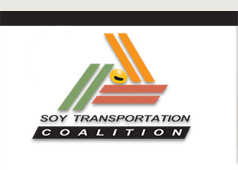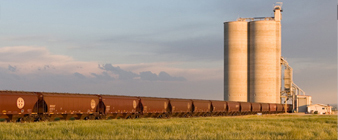 |
 |
|
| eNews • March 2014 | ||
| Promoting a Cost-Effective, Reliable and Competitive Transportation System |
||
 Soy shippers explore political fix for Highway Trust Fund
Soy shippers explore political fix for Highway Trust Fund
There has been no shortage of proposals in recent years to plug the widening gap in the federal Highway Trust Fund between user fee-receipts and obligations to pay states for 90 percent of the improvement costs on the deteriorating national highway system.
The Soy Transportation Coalition thinks it might have a solution for overcoming the political fear in Washington of raising taxes: addition by subtraction.
The Highway Trust Fund is likely to go over a fiscal cliff by the end of September when the balance in the HTF is projected to fall below zero and the Department of Transportation has to implement a moratorium on making commitments to reimburse states for new projects.
Many industry groups have said they are willing to accept an increase in the gas and diesel taxes and index them to inflation as long as the money is dedicated to actual infrastructure projects, while others say the nation needs to transition to a system to tax vehicle miles traveled to address the gains in fuel efficiency that have reduced tax collections at the fuel pump.
Alternative funding ideas in the past couple of years include replacing the motor fuel tax with an 8.4-percent sales tax on gasoline and a 10.6-percent sales tax on diesel (American Association of State Highway and Transportation Officials sent out that proposal), implementing a national sales tax with proceeds going for transportation, devoting royalties from oil and gas drilling to transportation, a tax-credit bond program for infrastructure supported by Customs fees, and creating an infrastructure investment fund from corporate profits induced back home from overseas.
Finding new revenues is the primary challenge facing Congress as it works in the coming months on a new multi-year surface transportation budget.
The Soy Transportation Coalition says it has commissioned Indiana University to study the impact of decreasing the fuel tax by 1 cent per gallon and indexing it to inflation on a national and state level (the 12 states represented by its state soybean board members). Efficient highways and bridges are critical for farmers to get their product to grain terminals and to get finished consumer foods to customers, the association said.
The study, expected to be released in April, will examine how much of a financial hit the nation and certain states would incur by a 1-cent reduction in the fuel tax and how much money would be generated in 10 years by indexing motor fuel taxes to inflation.
If indexing had been in place for the past 20 years, the gas tax would be at about 29 cents per gallon and the diesel tax would be 39 cents per gallon, compared to 18.4 cents and 24.4 cents per gallon, respectively, according to the Congressional Budget Office.
Every 1-cent increase in the gas tax generates about $1.5 billion for the Highway Trust Fund.
Decreasing the fuel tax seems counter intuitive when the goal is to increase resources for transportation, but it’s a way to provide political cover for politicians who realize the need to do something, but always find excuses, no matter the economic conditions, for why a gas tax would hurt their constituents, Michael Steenhoek, the coalition’s executive director, explained last week on the sidelines of the U.S. Chamber of Commerce’s infrastructure summit in Washington.
The decrease would allow members of Congress to claim they were providing a short-term concession to taxpayers in exchange for giving long-term sustainability to the transportation program. And indexing would eliminate the need for Congress to periodically revisit the issue and vote on future gas tax increases.
“So this is clearly designed to be a compromise piece of legislation. It’s not the ideal, but it deals with the political reality of lawmakers who are afraid of raising taxes,” Steenhoek said.
“This makes it harder for that accusation to stick,” he added.
But Grover Norquest, the president of Americans for Tax Reform, who is notorious for convincing many lawmakers to pledge their opposition to any tax increases and threatening them at the ballot box if they break their written commitment, has said in the past that indexing a tax to inflation is a way of making a tax permanent and should still be defined as a tax increase.
Source: American Shipper
Soy Transportation Coalition |
|
